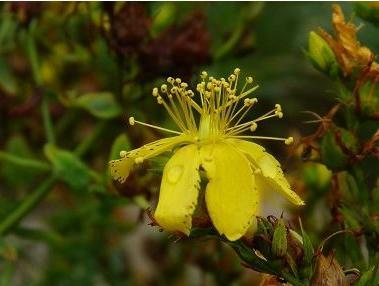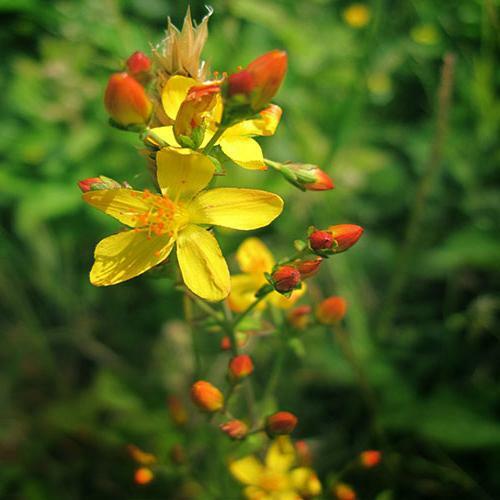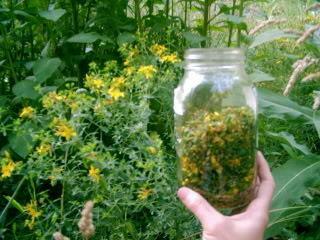Useful properties of St. John's wort and contraindications for use
St. John's wort is not one kind of perennial herbaceous plant, as, it must be, many people think, but the whole family. In total there are about 100 of its species. They are distributed mainly in Eurasia and North America.
 St. John's wort is easy to recognize by the characteristic rich yellow flowers collected in the inflorescence, and a specific, slightly tart smell. The name of the herb is due to the fact that this plant is absolutely non-toxic to humans, but in some species of animals( in particular, horses and cattle) can cause serious poisoning.
St. John's wort is easy to recognize by the characteristic rich yellow flowers collected in the inflorescence, and a specific, slightly tart smell. The name of the herb is due to the fact that this plant is absolutely non-toxic to humans, but in some species of animals( in particular, horses and cattle) can cause serious poisoning.
Useful properties of St. John's wort and contraindications to the use of this tool were of interest to specialists for a long time. Not for nothing that this plant is recognized as one of the most healing. The first detailed medicinal characteristics of St. John's wort belong to the ancient era and belong to Hippocrates, Pliny the Elder and Dioscorides. Even at the present stage of development of technologies for the production of medicines, the properties of this plant are indispensable.
Medical action
The main characteristics of St. John's wort, discovered by people for a long time, are relevant to this day. These include antimicrobial, disinfectant and anti-inflammatory effects. To this it is necessary to add antispasmodic and hemostatic properties. It becomes clear why in the past epoch the St. John's wort was so appreciated. Useful properties( photos of the plant attached) of this herb were used to heal wounds even in those times when there were no antiseptics at all. But today we should not neglect this powerful natural remedy.
 Useful properties of St. John's wort and contraindications to the use of this plant are mainly manifested when using its decoctions and infusions. In this form, this plant effectively fights against gastritis, different stages of enteritis, colitis( if it is not a bacterial form).The action is due to the fact that preparations based on St. John's wort remove irritation of the mucous membrane of the internal organs and thereby relieve pain, contributing to the rapid healing of all ulcers. Means based on this herb are used as an auxiliary component of the course of treatment for flatulence, hepatitis, cholecystitis, intestinal diseases, provoked by bacteria. In this case, the foreground is the ability of substances contained in St. John's wort, to oppress the harmful microflora.
Useful properties of St. John's wort and contraindications to the use of this plant are mainly manifested when using its decoctions and infusions. In this form, this plant effectively fights against gastritis, different stages of enteritis, colitis( if it is not a bacterial form).The action is due to the fact that preparations based on St. John's wort remove irritation of the mucous membrane of the internal organs and thereby relieve pain, contributing to the rapid healing of all ulcers. Means based on this herb are used as an auxiliary component of the course of treatment for flatulence, hepatitis, cholecystitis, intestinal diseases, provoked by bacteria. In this case, the foreground is the ability of substances contained in St. John's wort, to oppress the harmful microflora.
In diseases associated with impaired renal function, or in cases of fluid retention in the body, infusions and broths based on St. John's wort work as a mild natural diuretic.
If you properly use the useful properties of St. John's wort and do not ignore contraindications, you can discover an excellent tool for treating purulent otitis media, tonsillitis, stomatitis, tonsillitis, and strengthen the gums and get rid of the unpleasant odor in the oral cavity.
With age, many representatives of the strong half of humanity are facing problems associated with sexual dysfunction and prostatitis. In such cases it is recommended to use St. John's Wort. Useful properties for men are laid in this plant by nature itself.
Contraindications
 Do not reduce the numerous useful properties of St. John's wort and contraindications, and the side effects of using this natural medication. Therefore, it is worth taking them into consideration. Do not use decoctions, infusions and industrial medicines containing St. John's wort, in pregnancy and hypertension. This herb raises blood pressure, so it can even lead to hypertensive crisis or abortion!
Do not reduce the numerous useful properties of St. John's wort and contraindications, and the side effects of using this natural medication. Therefore, it is worth taking them into consideration. Do not use decoctions, infusions and industrial medicines containing St. John's wort, in pregnancy and hypertension. This herb raises blood pressure, so it can even lead to hypertensive crisis or abortion!
It is also not possible to use preparations containing St. John's wort longer than it is prescribed by the course of treatment. Before using St. John's wort alone or in combination with other drugs, you should consult your doctor.
